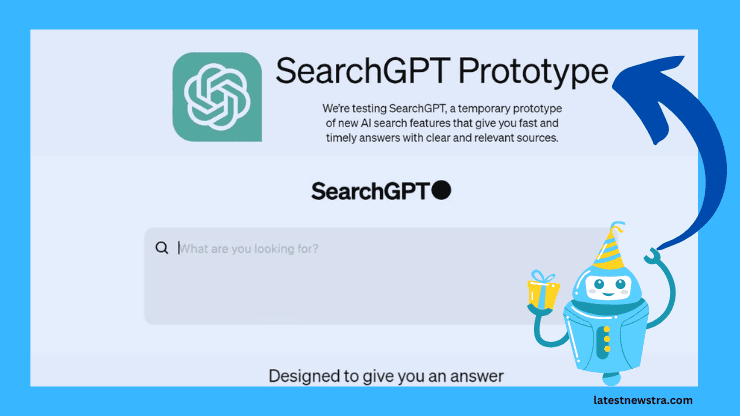OpenAI Launches Search Engine: Are you ready for a smarter search experience? OpenAI’s latest launch is setting the stage for a new era in information retrieval. By introducing a groundbreaking AI-powered search engine, OpenAI promises to deliver results that are not only fast but also highly relevant and precise.

Imagine a search engine that truly understands your questions and gives you tailored answers, all while prioritizing data privacy. In this article, we’ll explore how OpenAI’s search engine could transform the way we find information, helping you discover answers faster and more accurately than ever before.
What Makes OpenAI’s Search Engine Unique?
Unlike traditional search engines, OpenAI’s search engine doesn’t just provide links. It uses advanced AI algorithms to understand the context behind each query. OpenAI has designed its search engine to respond with accurate, relevant, and context-rich answers.
The search engine leverages the latest natural language processing (NLP) models. These models allow it to “understand” complex questions. Analyzing the context delivers answers in a more conversational and helpful way, reducing the time users spend sifting through multiple sources.
Key Features of OpenAI’s Search Engine
OpenAI’s search engine is packed with features that make it stand out. Here are some of the main highlights:
- AI-Generated Summaries
Instead of listing pages, the search engine provides brief, AI-generated summaries. This helps users get concise answers directly on the results page. Summaries are designed to answer questions quickly, saving users from having to click on multiple links. - Multimedia Search Capabilities
OpenAI’s search engine is designed for various media formats. Users can search for text, images, and even voice content. With the growing demand for image and video content, this feature offers a more complete search experience. - Real-Time Information Retrieval
OpenAI’s system is continuously updated, providing users with the latest information. This is especially valuable for news and real-time events where users need accurate, up-to-date results. - Contextual Understanding
The AI not only reads words but understands the intent behind them. For example, if you search “best phone under $500,” it understands that you’re looking for recommendations and provides specific suggestions within your budget.
Benefits of OpenAI’s Search Engine for Users
This search engine offers a fresh and efficient search experience for users. Let’s look at some of the main benefits:

- More Accurate Results: Since the AI understands context better, it brings up results that are more relevant. This can reduce the frustration of irrelevant links.
- Faster Answers to Complex Questions: If you have a detailed or multi-part question, OpenAI’s search engine can provide direct answers. This is useful for people who are researching or looking for precise information quickly.
- Personalized and Adaptive Results: OpenAI’s system adapts based on user preferences and search history, creating a more customized experience. Users get recommendations tailored to their needs.
Potential Impact on the Search Engine Market
OpenAI’s search engine could significantly disrupt the search industry. By focusing on AI-driven results, OpenAI is setting a new standard. Traditional search engines like Google or Bing use some AI, but OpenAI’s deeper use of AI in search algorithms could change user expectations.
For businesses in the search market, this raises the bar. Competitors may have to improve their AI capabilities to keep up. It also opens doors for partnerships between OpenAI and other tech companies. These collaborations could further advance search technology, benefiting users worldwide.
Privacy and Security Focus in OpenAI’s Search Engine
In an age where data privacy is critical, OpenAI prioritizes security. Their search engine is built with strict data privacy standards. OpenAI claims they do not collect unnecessary data and provide users control over their data. Users can even opt out of certain data collection practices.

Moreover, the search engine complies with global privacy regulations, like GDPR, making it a trustworthy choice for privacy-conscious users.
The Future of AI-Driven Search Engines
AI-driven search engines are the future. OpenAI’s entry into the field shows how AI can reshape information access. With continuous upgrades, OpenAI’s search engine may integrate even more advanced features. For example, it could include AI assistants that guide users through complex information or provide interactive responses.

Additionally, OpenAI’s approach could inspire more companies to build AI-centered products. These innovations might include search engines that don’t just respond to queries but anticipate user needs.
Conclusion: openai launches search engine
OpenAI’s search engine is a bold step toward a smarter and more user-friendly search experience. Its AI-driven features, from real-time information to contextual understanding, are reshaping how people access information. By combining accuracy, privacy, and adaptability, OpenAI is setting a new standard in the search market.
As users become familiar with this technology, it’s clear that AI-powered search engines are not just a trend but a transformative shift. OpenAI’s innovation encourages others to enhance search experiences, making it an exciting time for tech and information access.
Is OpenAI a search engine?
No, OpenAI is an AI research organization, not a traditional search engine like Google.
How to search in GPT?
Use GPT-based platforms like ChatGPT by entering prompts or questions to get AI-generated responses.
Is there a ChatGPT search engine?
No, ChatGPT is an AI assistant, not a dedicated search engine like Google or Bing.
What is the new search engine with AI?
OpenAI’s AI-powered search engine provides context-driven, accurate results, enhancing traditional search with advanced AI algorithms.
